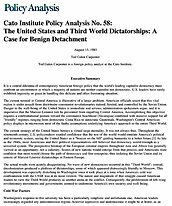It is a central dilemma of contemporary American foreign policy that the world’s leading capitalist democracy must confront an environment in which a majority of nations are neither capitalist nor democratic. U.S. leaders have rarely exhibited ingenuity or grace in handling this delicate and often frustrating situation.
The current turmoil in Central America is illustrative of a larger problem. American officials assert that this vital region is under assault from doctrinaire communist revolutionaries trained, funded, and controlled by the Soviet Union. Danger to the well-being of the United States is immediate and serious, administration spokesmen argue, and it is imperative that the Marxist-Leninist tide be prevented from engulfing Central America. Accomplishing this objective requires a confrontational posture toward the communist beachhead (Nicaragua) combined with massive support for all “friendly” regimes, ranging from democratic Costa Rica to autocratic Guatemala. Washington’s Central American policy displays in microcosm most of the faulty assumptions underlying America’s approach to the entire Third World.
The current strategy of the United States betrays a virtual siege mentality. It was not always thus. Throughout the nineteenth century U.S. policymakers exuded confidence that the rest of the world would emulate America’s political and economic system, seeing the United States as a “beacon on the hill” guiding humanity to a better future.[1] As late as the 1940s, most Americans and their political representatives still believed that democracy would triumph as a universal system. The prospective breakup of the European colonial empires throughout Asia and Africa was generally viewed as an opportunity, not a calamity. Scores of new nations would emerge from that process, and Americans were confident that most would choose the path of democracy and free enterprise, thus isolating the Soviet Union and its coterie of Marxist-Leninist dictatorships in Eastern Europe.
The actual results were acutely disappointing. No wave of new democracies occurred in this “Third World”; instead, decolonization produced a plethora of dictatorships, some of which appeared distressingly friendly to Moscow. This development was especially disturbing to Washington since it took place at a time when America’s cold war confrontation with the USSR was at its most virulent. The nature and magnitude of that struggle caused American leaders to view the Third World primarily as another arena in the conflict. Consequently, the proliferation of left-wing revolutionary movements and governments seemed to undermine America’s own security and well-being.

This work is licensed under a Creative Commons Attribution-NonCommercial-ShareAlike 4.0 International License.

